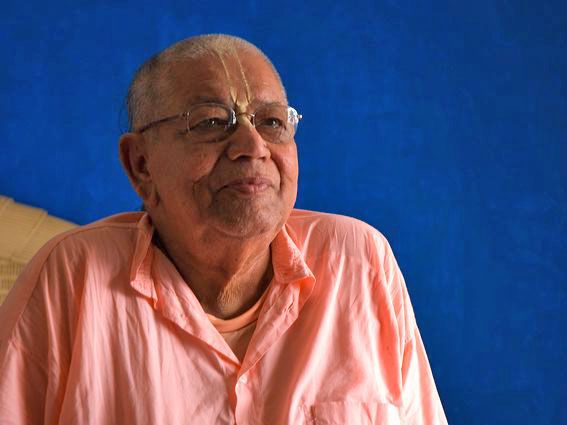The relationship between vidhi and raga.
By Srila Bhakti Sundar Govinda Dev-Goswami Maharaj
After the disappearance of Srila Guru Maharaj, Srila Bhakti Raksak Sridhar Dev-Goswami Maharaj, difficulty must come, and we are facing that now. When Guru Maharaj was present it was not necessary for us to maintain vidhi-marg. But now it is necessary sometimes.
Question: I always understood that by practising sadhana-bhakti, one comes to the spontaneous, or raga, platform. But I’ve heard here at Sri Chaitanya Saraswat Math that our line is raga-marg from the beginning.
Srila Govinda Maharaj: Yes, from the beginning.
There are two margas [paths]: one is raga, and the other is vidhi. But where there is raga-marg, there is also some vidhi-marg. I cannot say to my father, “You are my brother-in-law.” My father is my father, and I shall give honour to my father as my father, not as my brother-in-law. That is one type of vidhi. Vidhi-marg and raga-marg are different, no doubt, but it is necessary to first understand what raga-marg is. Raga-marg is hankering—very strong hankering to do service. A devotee in raga-marg cannot wait to do service. When it is necessary, they must maintain vidhi, but with hankering, so much hankering, to serve Krishna.
In this way the raga-marg bhakta sometimes overtakes vidhi. Understand? This is called raga-marg. Raga-marg does not mean that the devotee always wants to break the rules of vidhi-marg. The raga-marg devotee also tries to maintain vidhi-marg. There is only one route going to Vaikuntha, and that is the mood of service. Through service, we can go to Vaikunthaloka, and beyond that, Goloka, where there is only service to Krishna, and nothing else.
When very great hankering comes to the devotee of raga-marg, they cannot wait to purchase a ticket to Kolkata. When they have seen that the train is waiting at the platform and they knows that if they go to purchase the ticket the train will go, then they will not purchase the ticket; they will immediately go to the train. There may be a checker who may check for their ticket and give them a fine, but that is no problem for them; they must go to Kolkata at nine o’clock. This type of hankering is called raga-marg. Sometimes they break the rules, and they sometimes suffer for that, but they do not care. Sometimes a reaction comes, but they do not care about that. Sometimes also reactions may not come. Willingly, Krishna can release them from all difficulties. A ticket collector may not come to their compartment, but if one does come, then they are not fearful. They need to go. This is their position. It is an example.
When we break vidhi, then we must suffer something, but hankering does not care for that suffering, “Yes, I must suffer no doubt.” The gopis give their foot-dust to Krishna. They know who they are giving this to, and they know the result of doing it. What is the result? It may be ananta narak, eternal hell. Krishna is God, the Lord; if we give Him our foot-dust, that is not vidhi, and it must be harmful for us. But they do not care about that; they think, “Getting this dust, Krishna will be okay. That is enough for us.” They do not care about themselves. This is the example for vidhi-marg and raga-marg. Vidhi is always running in its own way, and raga is always overstepping it as hankering for service.
It is necessary that the devotee will be fully satisfied with their service. Otherwise they will suffer; if that hankering has not fully conquered their heart, then they must suffer by overstepping vidhi.
krsna-bhakti-rasa-bhavita matih
kriyatam yadi kuto ‘pi labhyate
tatra laulyam api mulyam ekalam
janma-koti-sukrtair na labhyate
[“Purchase ecstatic devotion to Krishna wherever it is available! The only price is hankering. It is not attainable by acting piously (practising vidhi-bhakti) for ten million lifetimes.”]
This is the raga-marg of Vraja. That type of hankering does not come easily. If you see that type of mentality in anyone, you must co-operate with them and take from them for your future benefit.
This is relationship between raga-marg and vidhi-marg. Everybody must try to follow vidhi-marg in this line.
Source
Spoken on 8 August 1989.









